After almost a year of being the Associated Students president, Autumn Alaniz-Wiggins sat down with The Orion to look back on her college career and what got her where she is today.
College career and presidency
The journey to becoming AS president doesn’t often include a stint with dropping out, but Alaniz-Wiggins did just that.
She lost faith in college after finding a lack of cultural awareness and education in her classes. However, she eventually came back to college, and made efforts to change what she saw as lacking.
Her journey at Chico State started in 2017. Alaniz-Wiggins only applied to CSUs and decided on Chico after visiting. The nature and campus caught her attention, and the financial aid package sealed the deal for her.
Alaniz-Wiggins came through the Educational Opportunity Program and started off as a nutrition major. However, her education came to an abrupt stop after two years when she decided to drop out.
She was out of school for three semesters. During this time she worked in farms and kitchens around America.
While living in Kansas, the pandemic was taking place. During this time she made the decision to give school another chance and returned to Chico in the 2021 spring semester.
Her original intent was not to come back.
“Staff love to point out that I took an educational leave instead of dropping out,” she said and laughed.
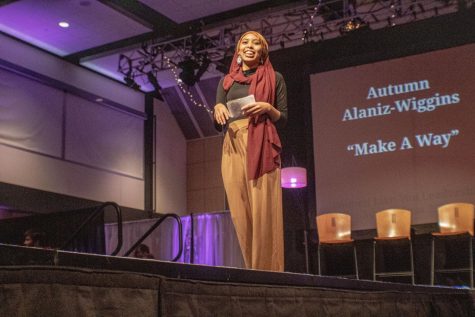
Her return to campus gave her the opportunity to connect with professor Seth Klobodu. Learning about his material, Alaniz-Wiggins joined his nutrition research lab and published a research project as a research assistant under him.
“He was like the only professor at that point, even in that entire semester, that was teaching culturally competent material,” Alaniz-Wiggins said. “And he was like the first Black professor that nutrition department had in I’m assuming over a decade, because I hadn’t seen any other faculty in that department.”
Her drive for progressing diversity and inclusion on campus was implemented through her various projects.
As director of social justice and equity in the 2022-2023 academic year, she created cultural display tables that celebrated Black History Month, neurodivergent awareness, Women’s History Month and other historical and inclusive celebrations.
Alaniz-Wiggins said she made sure to incorporate consideration for any type of population when discussing ideas or projects involving students.
One of her recent projects involves creating options for students to access locked buildings after a specific time. Alaniz-Wiggins considered that students without a phone or student identification on them would be the most vulnerable when trying to access buildings.
After taking this into consideration, she came up with a solution that could be accessible for all students. As long as the student knows their birthdate and student ID number they will be able to go into buildings if needed.
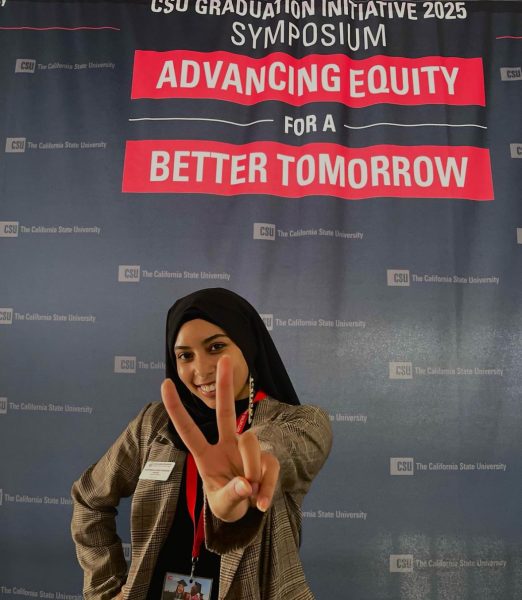
Despite having started as a nutrition major, she made the switch to multicultural gender studies a semester later after her return.
Alaniz-Wiggins yearned to expand her academic knowledge. Therefore she added sociology as a second major, and said her classes have challenged her.
While she believes that Chico still lacks in transparency and reaching out to as many students as possible, she also applauds Chico for its efforts on doing the same, such as the implementation of the 2025 Graduation Initiative.
“When there’s no transparency, then you don’t know you’re being divisive in certain ways or not inclusive in other ways,” Alaniz-Wiggins said.
Identity
Alaniz-Wiggins didn’t grow up strictly religious, but did go to Catholic school for some time. Though she “culturally” connected with Christianity, it wasn’t the right fit for her.
“I just didn’t feel like particularly joining the white man’s religion,” she said.
Alaniz-Wiggins was introduced to Islam through two very passionate Muslim friends a year and a half ago. She soon began going to the local mosque and exploring the faith.
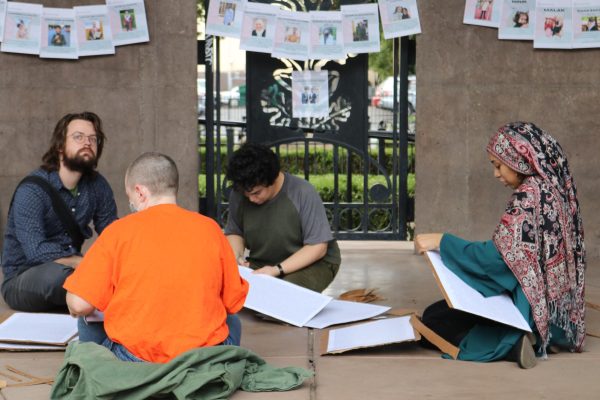
As of March 24, it has been one year since she proclaimed shahada, a testament of faith required for becoming a Muslim.
Now she wears a hijab. Prior to covering her hair, she dealt with people often asking to touch her hair, on top of all the maintenance that comes with textured hair.
When she realized people would stop approaching her about her hair, and that she would no longer have “bad hair days” she said she was “sold.”
Prior to converting, she said, “I was in my hot girl era.”
Now, she said she has gained an incredible amount of discipline from the religion.
The intersectionality of Islam and Black history also inspired her.
“I really like the connection with Black history and like the amount of respect it has brought the Black community through Islam,” she said. “Especially thinking about Malcolm X and Muhammad Ali.”
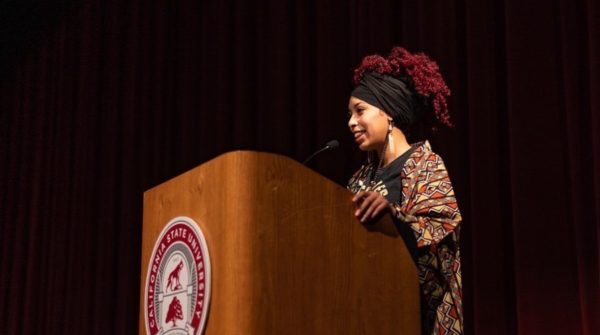
On the spiritual level, Islam brought her great “peace.”
She referenced this famous line from the Hadith about God’s message, “Whoever comes to Me walking, I will come to him running.”
With all the good Islam has brought her, Alaniz-Wiggins said she still doesn’t subscribe to every aspect of the religion, or rather the broader Muslim community.
Another part of Alaniz-Wiggins’ identity is that she is bisexual and queer.
“I don’t vibe with the homophobia in the religion, and that’s where me and some folks really, really disagree,” she said. “And it’s not like I can change like my queerness.”
Alaniz-Wiggins said she has many queer family members, and never felt too closeted. However, becoming Muslim has brought some of those feelings up.
“I definitely won’t lie, I do feel a little bit pushed back into a closet,” she said.
Being queer was never an issue for her family.
“I came out at Hooters the day before Christmas … I came out to my dad and he was just like, ‘We’ll talk about it later’ — never talked about it again,” she said and laughed.
She is currently navigating these aspects of her identity and seeing where she can build bridges in each community.
She said she is “… trying to break barriers between religion and sexuality. So I went to queer prom last year and I went as a hijabi.”
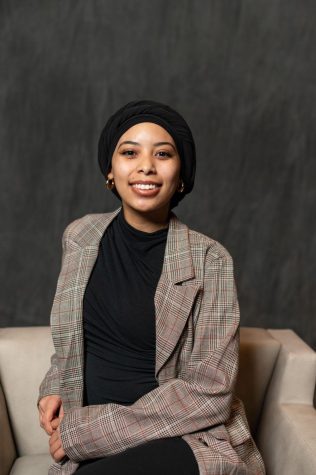
Alaniz-Wiggins has many intersecting identities in addition to her religion and sexuality including being Afro-Indigenous, Hispanic, a woman and a first-generation college student.
Being the first hijabi AS president or being the first Muslim woman president doesn’t mean as much to her, as the fact that the students voted for someone of her background to be their president.
Early life and family
Alaniz-Wiggins, born to Marine parents in Camp Pendleton, began traveling at the age of three when she moved to Okinawa, Japan for four years to live on base with her family.
She said growing up as a military child raised her sense of cultural sensitivity, and that this style of upbringing involved being open to immersing in diverse cultures. Still, she said she learned to be aware of topics like imperialism. Learning about this was both crucial and challenging, she said.
Looking back on Okinawa, she remembers the protests the locals held against the military and the base that she lived on.
Despite describing her childhood self as direct, outdoorsy and a bit of a tomboy, Alaniz-Wiggins still enjoyed playing with everyone’s favorite doll, Barbie.
Her father also made sure that her and her siblings’ hair was neat, being creative by using different Japanese hair accessories, which she fondly remembers.
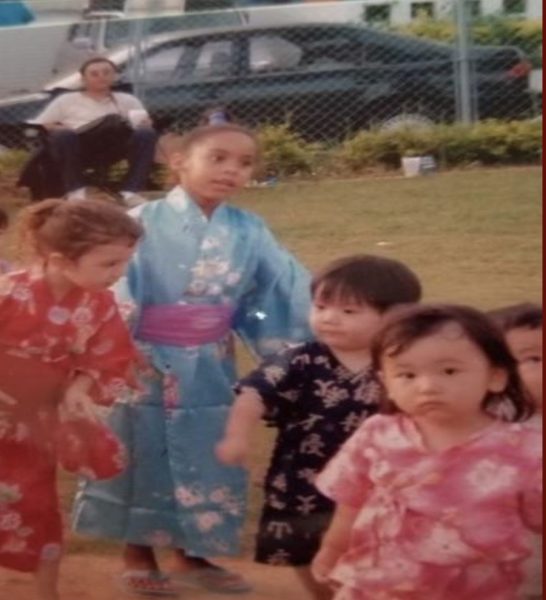
After Japan she moved to Georgia for a year and a half, followed by living in North Carolina; before returning to Japan for another four years. Since the age of eleven, she moved around in various California cities. As an adult, she resided in Kansas and Texas, before coming back to California.
“I grew up very proud of the military, being a part of it, but also aware that there is a privilege in that,” she said, expressing gratitude for the healthcare and other benefits she received.
She noted that being a part of a family that has been in the military for — three generations — came with an expectation to celebrate her family’s military lineage.
She said there is a prevalence of abuse present in a lot of military households, and her household was not an exception. She described this environment as “not healthy.”
She said she was pulled out of class for interrogation by social workers, which was embarrassing for her.
“I was getting a lot of visits from social workers,” Alaniz-Wiggins said, reflecting on the challenges of that time in her life.
The military has laws making adultery illegal.
Alaniz-Wiggins said her parents would constantly threaten each other with reporting each other for adultery.
She attended a Department of Defense Dependents School on base, a common experience for military children. However, if there wasn’t a class for her age group, she went to school off-base with the locals. She valued these classes.
“I didn’t feel like I was discriminated against or I was facing any particular types of hardships because of being Black,” Alaniz-Wiggins said about Japan.

After moving to the United States, Alaniz-Wiggins attended public high school prior to attending Chico State.
She never felt racial discrimination until she came to the United States, where she started facing differences based on the color of her skin.
Looking back, and looking ahead
In the year Alaniz-Wiggins dropped out of school, she traveled across America working odd jobs seeing the country in a whole new light. In that year she said she did psychedelic mushrooms on her 21st birthday, she worked at a Jewish summer camp and later an old folks home.
“I found a lot of peace in the traveling, and I think that’s what’s really like empowered me now that I’m back,” she said.
She said students should try to take a gap year and explore if they are able to.
“… save up some money and fuck off into the woods, like highly recommend doing it,” she said. “It’s great.”
Looking ahead, Alaniz-Wiggins has a few months left of college. She is currently going through the process of applying to the Peace Corps and volunteering in Morocco, though she isn’t set on it. She is also applying to multiple fellowships that surround advocacy and politics.
Fabian Marian Gilea, Milca Elvira Chacon and Molly Myers can be reached at orionmanagingeditor@gmail.com.









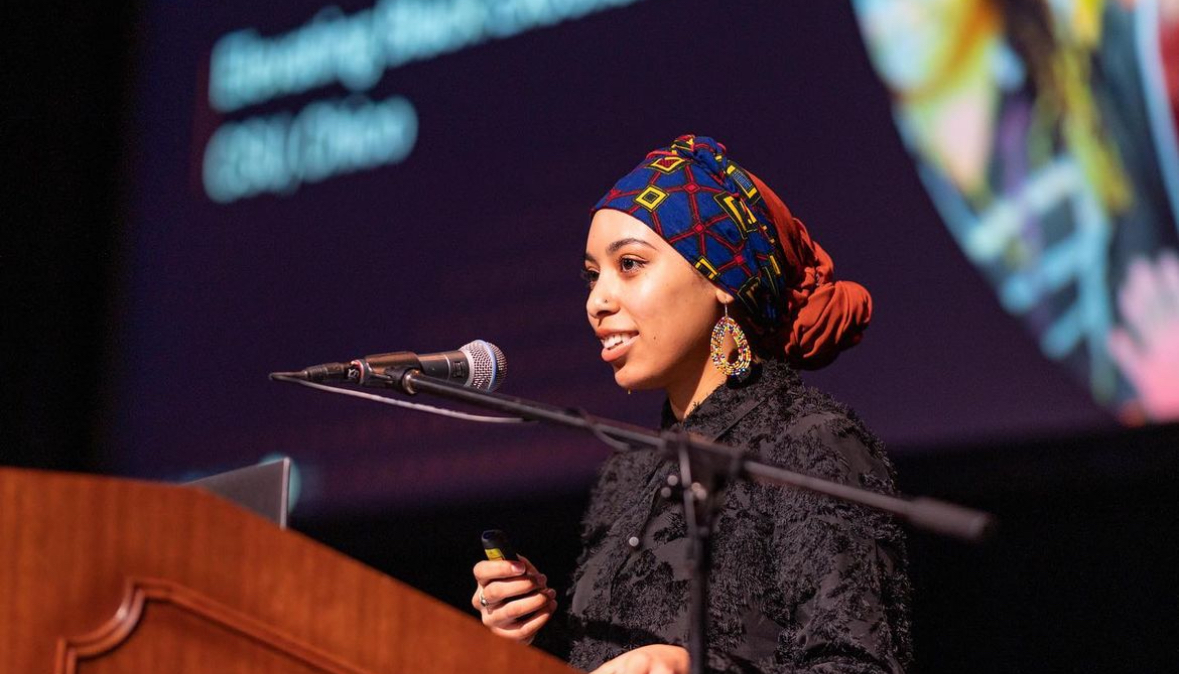
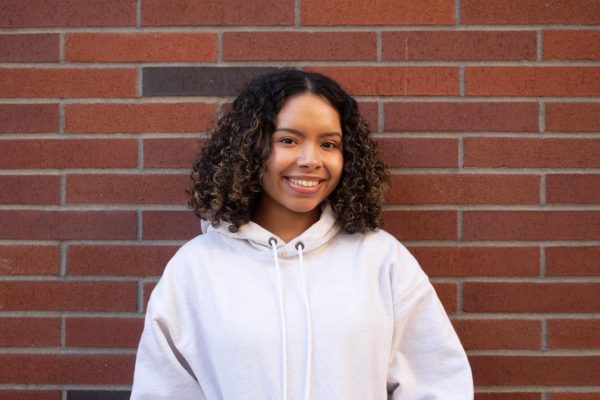
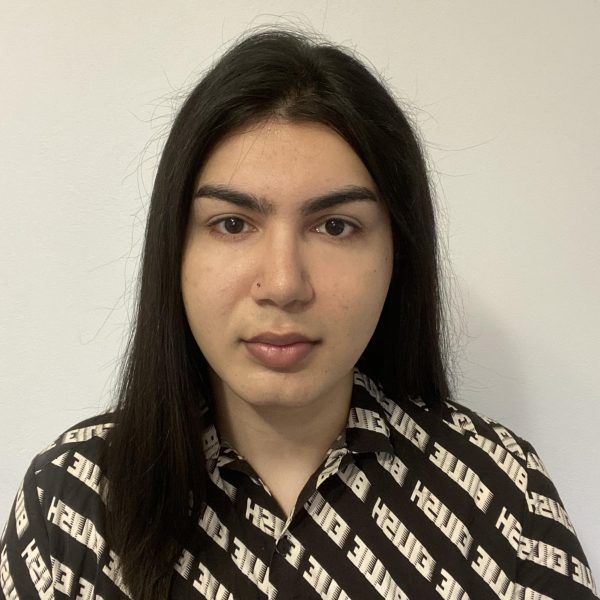
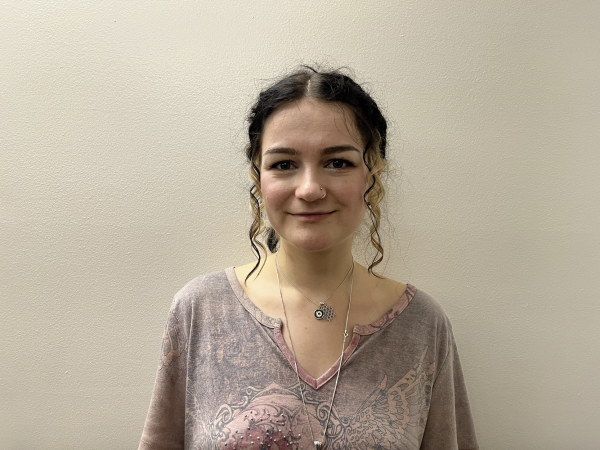
Ari Sorokin // Apr 4, 2024 at 8:37 pm
Throughout history, Muslims played a significant role in the slave trade, which is considered one of the largest in human history. Millions of men, women, and children were forcibly transported across the Sahara desert, with some fortunate enough to reach the Nile. Shockingly, many of the men captured were subjected to castration, contributing to the scarcity of descendants of black slaves in the Islamic world.
In World War I, British sailors embarked on perilous voyages across oceans to liberate black slaves held in Ottoman captivity. Tragically, thousands of British lives were lost in these efforts to end the slave trade, which officially ceased in the Islamic world on paper.Nevertheless, in modern times, regions like Sudan continue to witness atrocities against their black Christian population, with Arab rulers perpetrating acts of genocide.
It’s worth noting that the Arabic word for a black person is synonymous with “slave,” reflecting deep-seated historical associations.While Christianity was forcibly imposed on many Africans, it’s essential to recognize the early presence of the Ethiopian Orthodox Church, one of the oldest in the world, predating much of Europe’s adoption of Christianity. Moreover, Christianity has evolved in Africa, influencing religions like Voodoo, and has found resonance among Nigerian Christians due to shared religious values with the British.These historical insights underscore the importance of delving into Islamic and African histories to gain a comprehensive understanding of these complex dynamics.
If you want to reform Islam remember that the religion has just as much of its hands as any others but it is far less apologetic about it.